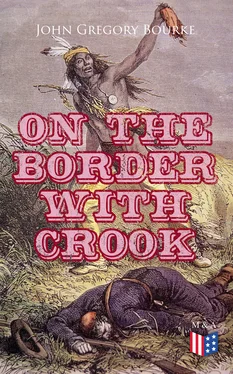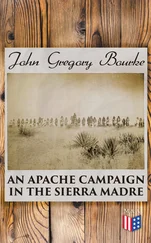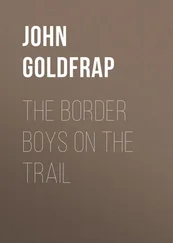“You see, it ’s jest like this,” he once remarked to the postmaster of one of the smallest stations in his jurisdiction, and in speaking the inspector’s voice did not show the slightest sign of anger or excitement—“you see, the postmaster-general is growling at me because there is so much thieving going on along this line, so that I’m gittin’ kind o’ tired ’n’ must git th’ whole bizz off mee mind; ’n’ ez I’ve looked into the whole thing and feel satisfied that you’re the thief, I think you’d better be pilin’ out o’ here without any more nonsense.”
The postmaster was gone inside of twelve hours, and there was no more stealing on that line while Duffield held his position. Either the rest of the twelve dollars per annum postmasters were an extremely honest set, or else they were scared by the mere presence of Duffield. He used to be very fond of showing his powerful muscle, and would often seize one of the heavy oak chairs in the “Congress Hall” bar-room in one hand, and lift it out at arm’s length; or take some of the people who stood near him and lift them up, catching hold of the feet only.
How well I remember the excitement which arose in Tucson the day that “Waco Bill” arrived in town with a wagon train on its way to Los Angeles. Mr. “Waco Bill” was a “tough” in the truest sense of the term, and being from half to three-quarters full of the worst liquor to be found in Tucson—and I hope I am violating no confidence when I say that some of the vilest coffin varnish on the mundane sphere was to be found there by those who tried diligently—was anxious to meet and subdue this Duffield, of whom such exaggerated praise was sounding in his ears.
“Whar’s Duffer?” he cried, or hiccoughed, as he approached the little group of which Duffield was the central figure. “I want Duffer (hic); he ’s my meat. Whoop!”
The words had hardly left his mouth before something shot out from Duffield’s right shoulder. It was that awful fist, which could, upon emergency, have felled an ox, and down went our Texan sprawling upon the ground. No sooner had he touched Mother Earth than, true to his Texan instincts, his hand sought his revolver, and partly drew it out of holster. Duffield retained his preternatural calmness, and did not raise his voice above a whisper the whole time that his drunken opponent was hurling all kinds of anathemas at him; but now he saw that something must be done. In Arizona it was not customary to pull a pistol upon a man; that was regarded as an act both unchristian-like and wasteful of time—Arizonanas nearly always shot out of the pocket without drawing their weapons at all, and into Mr. “Waco Bill’s” groin went the sure bullet of the man who, local wits used to say, wore crape upon his hat in memory of his departed virtues.
The bullet struck, and Duffield bent over with a most Chesterfieldian bow and wave of the hand: “My name’s Duffield, sir,” he said, “and them ’ere ’s mee visitin’ card.”
If there was one man in the world who despised another it was Chief-Justice John Titus in his scorn for the ex-marshal, which found open expression on every occasion. Titus was a gentleman of the old school, educated in the City of Brotherly Love, and anxious to put down the least semblance of lawlessness and disorder; yet here was an officer of the Government whose quarrels were notorious and of every-day occurrence.
Persuasion, kindly remonstrance, earnest warning were alike ineffectual, and in time the relations between the two men became of the most formal, not to say rancorous, character. Judge Titus at last made up his mind that the very first excuse for so doing he would have Duffield hauled up for carrying deadly weapons, and an occasion arose much sooner than he imagined.
There was a “baile” given that same week, and Duffield was present with many others. People usually went on a peace footing to these assemblies—that is to say, all the heavy armament was left at home, and nothing taken along but a few Derringers, which would come handy in case of accident.
There were some five or six of us—all friends of Duffield—sitting in a little back room away from the long saloon in which the dance was going on, and we had Duffield in such good humor that he consented to produce some if not all of the weapons with which he was loaded. He drew them from the arm-holes of his waistcoat, from his boot-legs, from his hip-pockets, from the back of his neck, and there they all were—eleven lethal weapons, mostly small Derringers, with one knife. Comment was useless; for my own part, I did not feel called upon to criticise my friend’s eccentricities or amiable weaknesses, whatever they might be, so I kept my mouth shut, and the others followed my example. I suppose that on a war-footing nothing less than a couple of Gatling guns would have served to round out the armament to be brought into play.
Whether it was a true alarm or a false one I couldn’t tell, but the next day Judge Titus imagined that a movement of Duffield’s hand was intended to bring to bear upon himself a portion of the Duffield ordnance, and he had the old man arrested and brought before him on the charge of carrying concealed deadly weapons.
The court-room was packed with a very orderly crowd, listening attentively to a long exordium from the lips of the judge upon the enormity and the uselessness of carrying concealed deadly weapons. The judge forgot that men would carry arms so long as danger real or imaginary encompassed them, and that the opinions prevailing upon that subject in older communities could not be expected to obtain in the wilder regions.
In Arizona, the reader should know, all the officers of the law were Americans. In New Mexico, on the contrary, they were almost without exception Mexicans, and the legal practice was entirely different from our own, as were the usages and customs of various kinds. For example, one could go before one of those Rio Grande alcaldes in Socorro, San Antonio, or Sabinal, and wear just what clothes he pleased, or not wear any if he didn’t please; it would be all right. He might wear a hat, or go in his shirt sleeves, or go barefoot, or roll himself a cigarrito, and it would be all right. But let him dare enter with spurs, and the ushers would throw him out, and it was a matter of great good luck if he did not find himself in the calaboose to boot, for contempt of court.
“Call the first witness; call Charles O. Brown.”
Mr. Charles O. Brown, under oath, stated his name, residence, and occupation, and was then directed to show to the judge and jury how the prisoner—Duffield—had drawn his revolver the day previous.
“Well, jedge, the way he drawed her was jest this.” And suiting the action to the word, Mr. Charles O. Brown, the main witness for the prosecution, drew a six-shooter, fully cocked, from the holster on his hip. There was a ripple of laughter in the courtroom, as every one saw at once the absurdity of trying to hold one man responsible for the misdemeanor of which a whole community was guilty, and in a few minutes the matter was nolle prossed.
I will end up the career of the marshal in this chapter, as we shall have no further cause to introduce him in these pages. His courage was soon put to the severest sort of a test when a party of desperadoes from Sonora, who had been plundering in their own country until driven across the line, began their operations in Arizona. At the dead of night they entered Duffield’s house, and made a most desperate assault upon him while asleep in his bed. By some sort of luck the blow aimed with a hatchet failed to hit him on head or neck—probably his assailants were too drunk to see what they were, doing—and chopped out a frightful gash in the shoulder, which would have killed the general run of men. Duffield, as has been shown, was a giant in strength, and awakened by the pain, and at once realizing what had happened, he sprang from his couch and grappled with the nearest of the gang of burglars, choked him, and proceeded to use him as a weapon with which to sweep out of the premises the rest of the party, who, seeing that the household had been alarmed, made good their escape.
Читать дальше












